- Postgraduate
Criminology MA
Overview
The MA Criminology is a dynamic course with flexible study options, allowing you to focus on your area of interest, whether that's global crime, terrorism or criminal investigations.
You will be encouraged to develop a critical understanding of the key concepts, ideas, and theories that underpin contemporary issues and political debates concerning the wider criminological discipline.
Additionally, you will learn from a dedicated and diverse team of scholars who are internationally renowned experts in their subject. All teaching staff on our master of criminology course have doctorates or extensive professional experience in the criminology/criminal justice sector.
You will also benefit from joining our wider research community at the Cybersecurity and Criminology Centre.
As well as gaining subject-specific knowledge and understanding, this Masters in Criminology degree course aims to equip you with transferable skills in research, communication, analysis and creative problem-solving, perfectly preparing you for the next stage of your career.

Select your desired study option, then pick a start date to see relevant course information:
Start date:
If your desired start date is not available, try selecting a different study option.
Why study Criminology with us?


What our students say…
I really like the course, the lecturers make you feel really comfortable. They're accessible and they do care about your future. They give us in-depth knowledge into their own experience working as lawyers within the criminal justice system.




Course detail & modules
Your Masters in Criminology degree combines academic rigour with the development of the skills you will need to pursue your career.
The core elements of the course cover theory, methods of research and contemporary issues in criminal justice while a range of optional modules enables you to focus on areas which specifically interest you.
The course structure will also help you to strengthen transferable skills that are useful to a range of potential employers such as:
- research
- communication
- analysis
- creative problem-solving.
You will be taught through a variety of teaching methods with a focus placed on active learning through participation. while our academic staff will use their current research and practical experience to inform your studies and support your development.
As you progress through the course, you will develop comprehensive knowledge and understanding of current issues. This will help you to reflect on your own development as a specialist in your chosen area.
Once you complete the course, you should be in a strong position to seek employment with a wide range of relevant organisations and build a satisfying career.
Optional modules are dependent on student interest and availability of teaching staff.
Please note: the 'Serious and Serial Offenders' optional module won't be running in the 2024/25 academic year.
Compulsory modules
-
Criminological Theory
In this module you will get an answer to the question: Why do Criminals Commit Crimes?! Immerse yourself in our Criminological Theory module, where you'll explore key perspectives from classical to modern, like strain theory and feminist criminology.
Learn from real-world scenarios and develop your analytical skills to unveil the complexities of criminal behaviour. This module sets the stage for advanced criminological studies—join us and unravel the mysteries of crime!
-
Applied Criminology
In this module you will consider and discuss the impact of criminology on a range of issues – as wide-ranging as counter-terrorism, criminal and social justice issues, and global security. With a focus on the application of criminological concepts, ideas and theories this module examines the types of crime that take place within our society.
-
Research Methodology
Research methods are a core element of any masters; however, researching criminal justice issues and criminology is complex and demanding. In this module, you will have to consider ethical issues, but also political, economic, legal and practical criminal justice issues to contend with. This module examines the challenges inherent in researching criminology and criminal justice.
Optional modules
-
Financial Crime
On this module you will be given the opportunity to deepen your understanding of the challenges faced by regulators and law enforcement officials, who are tackling the increased challenges posed by those perpetrating financial crime.
-
Serious and Serial Offenders
This module examines the definition, characteristics and offending behaviour of serious and serial offenders, with a particular focus on mass, spree and serial murderers, sexual offenders and arsonists. Serial non-violent offences such as white collar crime are also considered.
-
Transnational Organised Crime
You will critically examine the conceptualisation of transnational organised crime by looking at various illicit networks, trafficking routes, main markets, and trade in illegal commodities globally.
The dissertation module is delivered is in semester 2, but the module continues with supervision throughout semester 3 until submission in September.
Optional modules are dependent on student interest and availability of teaching staff.
Please note: the 'Complex Criminal Investigation' optional module won't be running in the 2024/25 academic year.
Compulsory modules
-
Contemporary Issues in Crime and Criminal Justice
You will be exposed to a range of substantive criminology and criminal justice issues at the forefront of the discipline. You will engage with contemporary debates in criminal behaviour and responses to it. You will also have the opportunity to further your critical thinking and research skills developed during your undergraduate studies.
-
Dissertation (Semester 2 + additional time)
The Dissertation module begins with a series of taught classes in semester 2, and then continues with one-to-one supervision throughout semester 3.
This module aims to provide you with an opportunity to undertake an autonomous piece of research on a topic of your choice. You will be able to decide on the methodology and approach building on the Research Methods module. This will enable you to learn independently, tackle research tasks with minimal supervision and contribute to the transfer of knowledge.
Your dissertation can focus on any relevant area of criminology and/or the course specialism, and does not need to relate specifically to the master's pathway chosen (although it is anticipated that in most cases it will).
Optional modules
-
Cybercrime and Internet Policing
The module aims to expose participants to a range of contemporary cybercrime-related issues and engage them with Internet policing strategies that have emerged in response to cybercrime problems at local, national and transnational levels.
-
Counter Terrorism
You will study the advanced conceptual, theoretical, and methodological skills relating the phenomenon of terrorism. You will focus on critical academic perspectives and the main challenges faced by law enforcement agencies and counter-terrorism strategies.
-
Complex Criminal Investigation
In this module you will develop an advanced understanding of the theory and practical nature of complex criminal investigations, that will enabled you to critically evaluate the application of investigative strategies to a range of different forms of complex criminal investigations, including homicides, sexual offences, organised crime and fraud.
Entry requirements
You should have an honours degree (2:2 or above) from a UK university or equivalent with appropriate criminology or legal content.
Applicants with relevant experience or training, normally from within the work environment will be considered on a case-by-case basis.
Find out more about our processes for recognising previous experience.
We look for students who show enthusiasm and a passion for the subject through previous study or professional experience.
If you have any questions about the relevance of your qualifications or experience please contact the course leader shown in the teaching staff.
You need to meet our English language requirement of 6.5 overall score for IELTS, with a minimum of 5.5 for each of the 4 individual components (Reading, Writing, Speaking and Listening). Visit our English language requirements page for information on other English language tests we accept.
You also need academic qualifications at the same level as UK applicants. In some countries where teaching is in English, we may accept local qualifications. Check for local equivalents.
We offer pre-sessional English language courses if you do not meet these requirements. Find out more about our English Language courses.
We look for students who show enthusiasm and a passion for the subject through previous study or professional experience.
If you have any questions about the relevance of your qualifications or experience please contact the course leader shown in the teaching staff.
Fees & funding
Please note:
- Fees for the 2026/27 academic year and onwards may be subject to Government regulation and change.
- Tuition fees are charged for each year of your course. If your course runs for two years or more, you will need to pay the fee for each academic year at the start of that year.
- If your course runs for less than two years, the cost above is for your full course and you will need to pay the full fee upfront.
- If no fee is shown above then the fees for this course are not available yet. Please check again later for updates.
Funding your studies
You may be eligible to apply for a postgraduate loan to cover your course and living costs.
Additional funding is available to some types of students, such as disabled students or those with dependants.
We offer a range of scholarships and bursaries, including awards for specific subjects.
Awards for law students are also on offer.
View full details, including conditions and eligibility.
Please note:
- Fees for the 2026/27 academic year and onwards may be subject to Government regulation and change.
- Tuition fees are charged for each year of your course. If your course runs for two years or more, you will need to pay the fee for each academic year at the start of that year.
- If your course runs for less than two years, the cost above is for your full course and you will need to pay the full fee upfront.
- If no fee is shown above then the fees for this course are not available yet. Please check again later for updates.
We offer scholarships for international students including International Ambassador Scholarships worth up to £5000. About the scholarship
Further information about funding and financial support for international students is available from the UK Council for International Student Affairs
Teaching staff

Dr Allan T Moore
Allan Moore is an Associate Professor of Criminology and the course leader for the MA Criminology at the University of West London. He also acts as the lead for both domestic and international academic partnerships for the School of Human and Social Sciences. Allan holds a PhD in law, criminology and psychology from the University of the West of Scotland, with further qualifications in law, research methods and teaching and learning in Higher Education. Allan is a Senior Fellow of the Higher Education Academy, and holds membership and / or fellowship or several professional bodies.
Research that Allan carries out includes areas such as mass atrocities (genocide, crimes against humanity, terrorism and political violence), transitional justice, restorative justice, organised crime (domestic and transnational), and other wider areas linked with criminology and victimology, as well as areas linked with the investigation, policing and prosecution of crime.
Geographically, although not restricted to these areas Allan has particular interests and expertise in Sub-Saharan Africa. He has collaborated with academics in Rwanda and Kenya for academic writing and funded research, and has supervised and examined doctoral research covering countries including Nigeria, Cote d’Ivoire, South Africa and Namibia.
Allan has worked on research projects funded by bodies and institutions including the British Council (2018 & 2019), the Ministry of Defence (2017), and the Scottish Government (2021).
Allan Moore is an Associate Professor of Criminology and the course leader for the MA Criminology at the University of West London. He also acts as the lead for both domestic and international academic partnerships for the School of Human and Social Sciences. Allan holds a PhD in law, criminology and psychology from the University of the West of Scotland, with further qualifications in law, research methods and teaching and learning in Higher Education. Allan is a Senior Fellow of the Higher Education Academy, and holds membership and / or fellowship or several professional bodies.
Research that Allan carries out includes areas such as mass atrocities (genocide, crimes against humanity, terrorism and political violence), transitional justice, restorative justice, organised crime (domestic and transnational), and other wider areas linked with criminology and victimology, as well as areas linked with the investigation, policing and prosecution of crime.
Geographically, although not restricted to these areas Allan has particular interests and expertise in Sub-Saharan Africa. He has collaborated with academics in Rwanda and Kenya for academic writing and funded research, and has supervised and examined doctoral research covering countries including Nigeria, Cote d’Ivoire, South Africa and Namibia.
Allan has worked on research projects funded by bodies and institutions including the British Council (2018 & 2019), the Ministry of Defence (2017), and the Scottish Government (2021).
Study & career progression

A degree in criminology can lead to an array of rewarding jobs within the criminal justice system and related fields such as:
- Youth and community worker
- Police Officer
- Detective
- Compliance Analyst (Anti-Money Laundering)
- Welfare and Housing Associate Professional
- Prison Service Officer
- Legal Associate
- Protective Service Professional
- Research Assistant
- Homeless Charity Project Worker
- Court Administration
- UK Border Force.
Recent UWL criminology degree graduates have gone on to work for employers including:
- Metropolitan Police
- Hertfordshire Constabulary
- J.P. Morgan
- Westminster Youth Offending
- HM Courts and Tribunals Service
- Public Health England
- Sodexo
- Various hospitals.
If you would like to specialise further in an area of particular interest, please see the options for doctoral study.
How to apply

You can apply online at any time by following the link below.
Our application form will ask you for some information about:
- what you want to study
- your previous qualifications or experience
- your references
- how we can contact you.
Want to ask us a question first? We would love to hear from you. Contact us free on:
- 0800 036 8888
- courses@uwl.ac.uk
Apply for this course
Next steps after making your application
We aim to make a decision on your application as quickly as we can. If we need any more information about your qualifications, we will be in touch.
In the meantime, come and visit us and find out more about what studying at UWL is like. Sign up for an open day or join a campus tour.
Visit us and see for yourself
Talk to our tutors and find out about our courses and facilities at our next open day or join a campus tour.
We're here to help
Any questions about a course or studying at UWL? We're here to help - call us on 0800 036 8888 (option 2, Monday – Friday 10am-4pm) or email us on courses@uwl.ac.uk.
Our postgraduate prospectus
All of our courses in one place - download now or order a hard copy.

You can apply online at any time by following the link below.
Our application form will ask you for some information about:
- what you want to study
- your previous qualifications or experience
- your references
- your visa (if required)
- how we can contact you.
Want to ask us a question first? Our dedicated international students’ team would love to hear from you.
- email international@uwl.ac.uk to submit a question
Apply for this course
Next steps after making your application
We aim to make a decision on your application as quickly as we can. If we need any more information about your qualifications, we will be in touch.
In the meantime, come and visit us and find out more about what studying at UWL is like. Sign up for an open day or join a campus tour.
Visit us and see for yourself
Talk to our tutors and find out about our courses and facilities at our next open day or join a campus tour.
We're here to help
Any questions about a course or studying at UWL? We're here to help - call us on 0800 036 8888 (option 2, Monday – Friday 10am-4pm) or email us on courses@uwl.ac.uk.
Our postgraduate prospectus
All of our courses in one place - download now or order a hard copy.
Related courses
Search for courses
Student life at UWL
Important notes for applicants
Disclaimer
*Modern universities - defined as higher education institutions that were granted university status in, and subsequent to, 1992.
**The National Student Survey 2023 and 2024 - Average of answers to all questions by registered student population. Excludes specialist institutions.
Testimonials - our students or former students provided all of our testimonials - often a student from the course but sometimes another student. For example, the testimonial often comes from another UWL student when the course is new.
Optional modules - where optional modules are offered they will run subject to staff availability and viable student numbers opting to take the module.
Videos - all videos on our course pages were accurate at the time of filming. In some cases a new Course Leader has joined the University since the video was filmed.
Availability of placements - if you choose a course with placement/internship route we would like to advise you that if a placement/internship opportunity does not arise when you are expected to undertake the placement then the University will automatically transfer you to the non-internship route, this is to ensure you are still successful in being awarded a degree.



